Search Results for Tag: rio de janeiro
Climate Champ – Provide Environmental Education
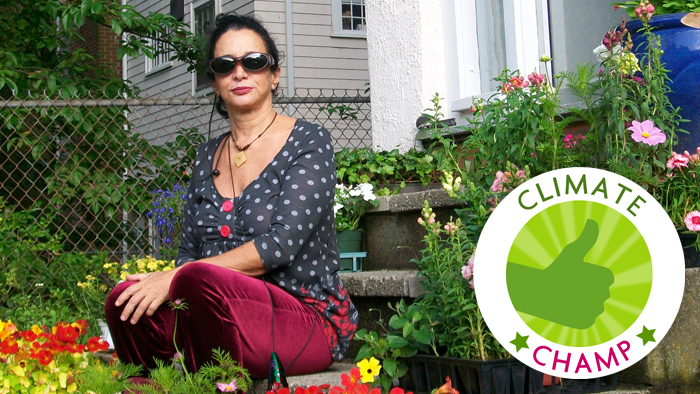 Do you feel responsible for our future? Are you tired of waiting for a breakthrough at climate conferences? If you are already taking action yourself, you are our ClimateChamp and we want to get to know you! Answer our questionnaire to become a part of our new blog series, take your chance to be nominated as a Climate Champ.
Do you feel responsible for our future? Are you tired of waiting for a breakthrough at climate conferences? If you are already taking action yourself, you are our ClimateChamp and we want to get to know you! Answer our questionnaire to become a part of our new blog series, take your chance to be nominated as a Climate Champ.
1. What is your name? How old are you? Where do you live? What is your job?
My name is Kátia Martins de Almeida. I am 61 years old and I live in Rio de Janeiro, Brazil. I am a clinical Psychologist and I used to live in Boston, MA. Here I was working with streets kids and as a Psychologist in public schools. In 2003 when I came back to Brazil to take care of my mother, I bought land in Cruzeiro. Now I am retired and I live in a two-room-apartment in front of the Sugar Loaf.
2. How does the climate change affect your everyday life in your community?
The community life in the village Cruzeiro had totally changed in the last 5 years. More clearly, on the 12th of January 2011 a huge amount of water came from the sky, with lightening I have never seen before. The massive rain broke 50 tons of rocks of from our granite mountains which rolled over the houses of the village. The river raised 3 meters in 3 minutes. In these 3 minutes we lost the only bridge that we had and 20 houses were destroyed. Furthermore, and even more tragic, 2 people died. Cruzeiro is a small agricultural village with 500 families. Most of the people around here are framers. The community is in total grief because of all their losses and sorrows about their identity: the land was completely mud and they had to move to somewhere else. After that thunderstorm the government did not help us. It is rumored that corrupted politicians had stolen money which the Federal Government gave to the City Hall of Teresópolis (another affected village where more than 1000 people died). Fact is the government did not build a new bridge in our village Cruzeiro, neither they helped us to rebuild the destroyed houses.
3. What trigger event led you to start fighting climate change?
2003 when I bought my land, the Neighborhood Association of Cruzeiro found a water source inside it. With 70 volunteers, they built a pipe leading to the village, where the Association has a water wheel and shares the water for a fee of 6 Real (about 2 Euro). Among others, the collected money is for the bakery, the butcher, the shoemaker and for the 20 family-houses, which disappeared under the water on January 12th 2011.
4. How exactly do you fight climate change?
I founded a non-profit organization in order to make it easier to help my community. In 2009 I was trying to start a project to transform my 400.00 m2 land of natural jungle (in Cruzeiro, Brazil) into a World Natural Reservation.
5. What do you say to climate change deniers?
Denial is a mental disease and must be treated like that. Or they are cynical. I would like to invite them to come to some beaches here in Brazil that are disappearing and also to come to visit the families of the Rio de Janeiro’s agricultural belt. We are the salad garden of Rio de Janeiro! If we loose our plantations, Rio will have trouble eating green leaves and fruits.
6. Worst case scenario: What do you think your city looks like 10 years from now, if no action had been taken to fight climate change?
It will disappear because without hope for good future the youth is leaving. There is some kind of “Youth Exodus” in all agricultural villages.
7. Best case scenario: What do you think your city looks like 10 years from now, if more and more action had been taken to fight climate change?
If we provide environmental education to the people who live around the river Rio Paquequer, we can avoid a lot of problems about trash and diseases.
8. Short and simple: What do you demand from your government as far as climate change is concerned?
Stop killing Amazon, first of all! The government must introduce environmental education in the curriculum of all Brazilian schools. The government has to give us sewers or pipes for ourselves to build our sewers and also they have to give us trash bags to pick up heavy trash. Another point is to talk with the farmers to avoid some bad ecological habits.
9. How can interested people take part in your project?
Asking them to come to visit Rio de Janeiro and its rural farms and see the reality that the Media does not show about Rio.
New Directions for the Brazilian Amazon
The Amazon rainforest is spread out over nine national states of the South American continent. As trees bind carbon dioxide (CO2), the Amazon forest plays a crucial role in climate protection measures. Home to 60 percent of the world’s rainforest area, Brazil contains the largest part of this precious ecosystem.
GLOBAL IDEAS asked Brazilian forest activist Pedro Soares to write a guest article for our blog. Pedro stresses that we can only protect the Amazon by providing an adequate income to those living in the forest.
By Pedro Soares
The Brazilian Amazon area covers about 50 percent of Brazil’s territory. That is a total an area of 4,196,943 square kilometers.
The biggest stock of tropical forest in the world has always been seen as a barrier to regional economic development. In fact, deforestation occurs mainly due to an economic rationale: the forest does not provide sufficient income for landowners and forest dwellers, when compared to the income they could obtain for more profitable activities such as logging, agriculture or cattle ranching. But the lack of an economic value for the stand forest is the main caveat towards the promotion of forest conservation policies and programs.
![]() read more
read more
Rio plus you
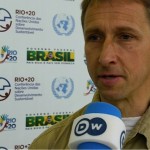
Stefan Rostock, Germanwatch
Author: Kerstin Schnatz
A huge disappointment, a good basis to work from or “a major step forward in achieving a sustainable future” as the United Nations have put it? Depending on who you ask, the outcome of the United Nations Conference on Sustainable Development in Rio de Janeiro in June 2012 is evaluated differently.
In the run-up to the so called Rio+20 Earth Summit, we had asked our Global Ideas crowd to forward their questions to participants of the summit. In Rio, our reporters Philipp and Kerstin asked Stefan Rostock from the non-governmental organisation Germanwatch to answer them. Stefan followed the negotiation process very closely – listen to his answers:
Stefan Rostock Germanwatch by ideasforacoolerworld
About Germanwatch
The non governmental organisation Germanwatch advocates for a more sustainable future in countries of the so-called “South”. It researches and highlights the global consequences that economies and politics of industrialized states have on developing and threshold states – situated mostly in the geographical South of the planet. Germanwatch is based in Bonn and Berlin.
About Rio+20
The United Nations Conference on Sustainable Development took place in June 2012 in Rio de Janeiro, Brazil. With almost 30,000 participants from all around the world including representatives of 191 UN member states as well as 10,000 NGO people and almost 4,000 journalists, it was the biggest conference in the history of the United Nations. Download the 50-page outcome document “The future we want”.
Minister receives green bracelet
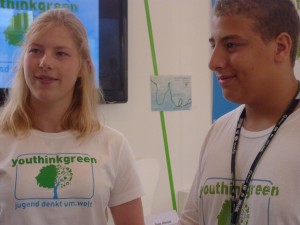
Ahmed together with one of his fellow climate ambassadors from Youthinkgreen.
Author: Kerstin Schnatz
Ahmed’s big eyes are beaming with pride. The young Egyptian is standing on the stage of the German Pavillon in Rio de Janeiro. The 16 year old pupil has started a recycling project at Kairo’s German school which he is presenting to an international audience today at the Rio+20 conference.
“Be the change you want to see in the world“
While politicians are negotiating the final document of the United Nations Conference on Sustainable Development just across the street, Ahmed wants to take action: „In Egypt no one separates their rubbish. Plastic, paper, food waste – everything goes into one bin.”
Triggered by the German initiative Youthinkgreen, the couragious teenager and his classmates set up a plastic recycling scheme at their school. The green initiative is supported by chancelor Angela Merkel and has reached over 200 young people in over ten countries so far. Some of them have come to the Rio+20 summit to present their local projects.
Change does not come easily
“A recycling company to pick up the plastic waste was found very easily.“ Ahmed reflects on his own initiative back home. “But after a few weeks, the garbage man told me that he would stop picking up our bin. It was flooding over with a variety of food scraps, paper and aluminium cans.” To get everyone at school to separate their rubbish correctly, a rota was set up. When asked how he made his classmates do the smelly job, Ahmed laughs: „At the beginning no one wanted to bring down the odd rubbish bin. Now you get a bag of sweets, so my friends sometimes even fight over it.”
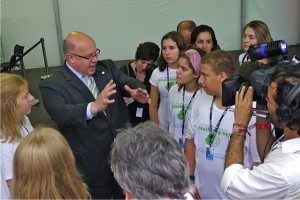
Peter Altmaier and the Youthinkgreen crowd at the Rio+20 summit.
Handshake with a Minister
After the presentation, Ahmed even gets a chance to meet the German Environment Minister Peter Altmaier. Together with his friends from the Youthinkgreen crew, the young man has managed to sneak into Hall 4 – a restricted area and normally reserved for state and United Nations delegates only. But Ahmed keeps his cool and steps up right next to Altmaier: „We have come to bind a green bracelet to your wrist!“ Ahmed and his friends hope that through this little gesture the politician will be reminded of young people’s longing for a greener future.
Altmaier who just turned 54 two days before, laughs heartily and stresses how important it is that young people take action. The Minister takes his time, listens patiently to everything the youngsters tell him. “Please visit Egypt and help us to put up more solar panels.“ Before the journalists can push in to fire their questions at the Minister, Ahmed has grabbed the opportunity to speak up again. Altmaier says that he wishes all the best for Egypt but that he unfortunately can not be in every country at the same time but will remember this meeting. Then he turns around to talk into the television cameras.
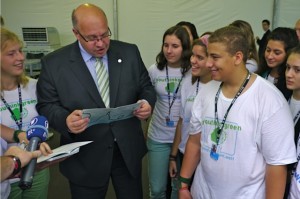
At the Rio+20 congress, teenagers from Youthinkgreen handed over green bracelets and a position paper to politicians and scientists from around the world.
“Far less than we know is needed”
What should the delegates at the Rio+20 summit agree on? What will the outcome most likely look like? That’s what we asked visitors of the UN conference. The United Nations Conference on Sustainable Development is going to end on Friday.




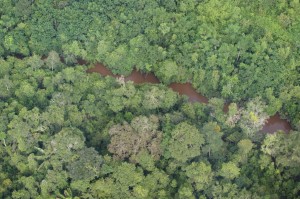




Feedback